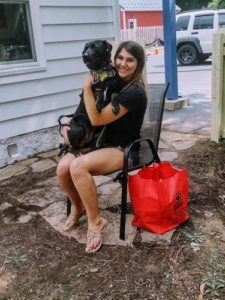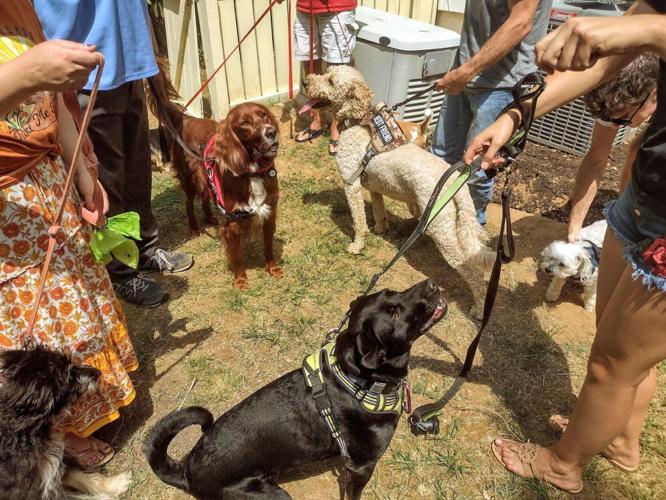‘Canines for Recovery’ meeting in B’ville
By CHARLIE ZAVALICK Editor
BERNARDSVILLE – Community In Crisis, the non-profit recovery support organization headquartered here, is going to the dogs. Or, more accurately, the dogs are coming to the CIC Community Hub at 9 Church St. to lend a paw.
Launching a new program called “Canines for Recovery,’’ CIC has opened its doors to four-legged friends and their masters for several outdoor recovery meetings for the first time this summer. The “all recovery format’’ is specially designed to celebrate people’s best friends and the therapeutic value they provide.
“The paradigm now in the recovery field is recognizing multiple pathways to recovery,’’ explained Ken Musgrove, director of recovery at CIC, during a canine session on Saturday, Aug. 20. “Not every pathway is going to work for every person. It appeals to certain people, and that’s all we’re looking for. We know we’re not going to get everybody but let’s knock down the barriers for some.’’
Musgrove first shared his idea for the new program with Sarah Popa, a dog lover who had previously worked as a veterinary tech before joining CIC as peer services supervisor. “I knew Sarah loved animals and I said, ‘Would you like to do that?’ ‘’ Musgrove said. “She said yeah, and coincidentally ended up coming to work for us. Let’s see if we can do this. Anecdotally and from we’ve read, we know that dogs can help in the healing process with many things.’’
 Therapy dogs are widely used to cheer up patients at hospitals, lift the spirits of seniors at nursing homes, and to provide emotional support for students and veterans. Why not substance recovery as well? Popa said having dogs at recovery meetings has added an element of fun to otherwise serious conversations. “There’s a lot of heavy topics that come up,’’ she said. “We’re dealing with people who have had a lot of trauma, heavy drug use, people who overdosed and have a second chance at life.
Therapy dogs are widely used to cheer up patients at hospitals, lift the spirits of seniors at nursing homes, and to provide emotional support for students and veterans. Why not substance recovery as well? Popa said having dogs at recovery meetings has added an element of fun to otherwise serious conversations. “There’s a lot of heavy topics that come up,’’ she said. “We’re dealing with people who have had a lot of trauma, heavy drug use, people who overdosed and have a second chance at life.
“What it does is gives people the space, with the comedic relief of a dog barking or licking your face – almost a reminder that you need to take life seriously but with dogs around, it doesn’t always have to be that way. We’re able to laugh, able to find joy in the smaller things.’’
CIC has hosted three canine recovery meetings so far. One session in June drew about 10 participants and nearly an equal number of dogs, the largest group to date. Organizers are trying to find the right day and time for future sessions.
“We’re trying to do it monthly but need more input from the community,’’ Musgrove said. “Sarah thinks maybe if we do it more regularly we’d have better attendance. We’re still finding our way.
“We know it’s a winning formula,’’ he added. “We know there’s a need and people enjoy it. We’re just finding out time wise and day wise, when to do it, what works for people.’’
‘Allies’ Welcome
Run as an open format meeting, people don’t need to be in recovery to attend. Recovery “allies’’ are also welcome.
Those joining can their pups but it’s not required.
“The last meeting we had, there were three sets of parents with their children,’’ Musgrove said. “It’s a format that’s also open to family members and allies – you don’t even necessarily have your own dog.
“The first meeting we had more people than dogs, but the people just wanted to come and interact with the dogs. It’s disarming and it opens up people to a new level.’’
“I think there’s two sides of it,” Popa added. “You can bring your own dog, come and showcase your pup. It gets you out, it’s something fun you can do with your companion.
“It’s different – there’s only so many places that are dog friendly,’’ she continued. “I think being a dog friendly recovery center gets a lot of people in the door.
“The second side of that, is a lot of people come without dogs,’’ she said, noting that not everyone can own a dog, such as renters. “They can come and spend some time and open up. It may be a little easier to find that connection than if there were just people, because people can be intimidating.’’
Having dogs around helps calm people, she said.
“For someone who’s in recovery with a lot of heavy issues, having the ability to take a second and step back provides balance,’’ she said. “It can’t all be sad and hard.’’
“The premise is the pups, but the real meat and potatoes is the connection that we share with each other,’’ she added. “There’s something about animal people. We’re able to connect with animals better because people come with their own predispositions and beliefs. That can be a bit unnerving.
“But with the dogs, we find we have a lot more in common than we think. We share that love and that passion, and it brings us together and breaks that barrier down.’’
Musgrove said there has been interest from other recovery centers about the CIC canine program.
“One in particular asked about duplicating it,’’ he said. “Others expressed an interest.’’
Officials from recovery centers in the state will be gathering later this month in Robbinsville, he said, to share unique program ideas they’ve tried. One other idea tested used in “mobilized recovery,’’ he said, had participants go fishing.
He plans to promote the use of pups. “Again, multiple pathways,’’ he remarked. “What better ice breaker than the dog?’’
For more information on CIC and its programs, visit https://communityincrisis.org/.

